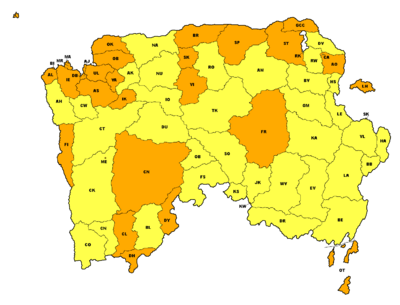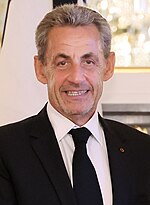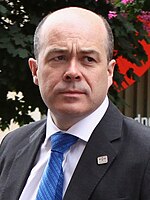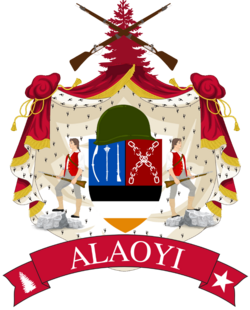2023 Alaoyian Presidential Election
| ||||||||||||||||||||
| Registered | 143,370,001 | |||||||||||||||||||
|---|---|---|---|---|---|---|---|---|---|---|---|---|---|---|---|---|---|---|---|---|
| Turnout | 78.1% (first round) 82.1% (second round) | |||||||||||||||||||
| ||||||||||||||||||||
 Entities won by Durand Francois
Entities won by Chris O'Riley | ||||||||||||||||||||
| ||||||||||||||||||||
The 2023 Alaoyian presidential election was the 9th quintannual presidential election, on 20 November. In addition to president, voters also elected members of the Senate and many local offices as well. As no candidate for president received more than half of the valid votes in the first round, a runoff election was held on 4 December. Durand Francois received a majority of votes cast in the second round, and therefore was elected as President of Alaoyi.
Incumbent Democratic President Adriaan Breytenbach was ineligible to pursue a third term due to the term limits established in Alaoyi's constitution. The Democratic nomination thus went to the leader of the right-wing Democrats and former governor of Blinnoblair, Alexander O'Haig. The Socialist nomination went to the former mayor of and senator from Magada. Other major nominations included businessman Chris O'Riley of the National Populist Party, former ambassador Finch Matthews of the Republican Alliance, and Joren Kleinlugtenbelt of the Farmer's Alliance.
Early campaigning focused on Breytenbach, a relatively popular president, and his legacy. While Democratic nominee Alexander O'Haig was of Breytenbach's party, he was from a rival faction that disagreed with the more moderate Breytenbach on most major issues, while Durand was more in line with his views on foreign policy and decentralization. In contrast, O'Riley and Matthews attempted to portray themselves as outsiders seeking to clean up politics, while Joren Kleinlugtenbelt tried to portray himself a centrist. Later in the campaign, amidst a brief but not insignifigant economic downturn and high tensions with Inglaterra and Dilania, the campaigns began to center around their response to the crisis and their foreign policy proposals.
Durand received the most votes in the first round, with 32.3% to second place O'Riley's 19.7%, outperforming his expected numbers in part due to a lower than expected result for Finch Matthews, his primary rival among the Alaoyian left. Another surprise occurred when National Populist Chris O'Riley took more votes than Democrat Alexander O'Haig, the first time where the incumbent party did not make it to the second round of the election since the 2003 election, when incumbent president and independent candidate Breasal Ó Conaill and Democratic Alliance candidate Mbat Mokaril O'Riley beat O'Haig by a margin of 90,000 votes out of 44.5 million cast for the two candidates, a margin of 19.7% for O'Riley versus 19.6% for O'Haig. Nevertheless, Durand's performance was the best-ever for a Socialist in the first round of a presidential election. In the second round, Durand received 53.1% of the vote to O'Riley's 46.9%, a comfortable margin exceeded only by Adriaan Breytenbach's electoral victory in the 2013 election. Durand became the first former executive of a federal city to win election and the first ever Marchan president.
International observers affirmed that the election was free and fair, with delegations from both The Furbish Islands and Greater Niagara praising the elections as an exercise in free democracy. This was the first election in Alaoyian history to feature no Ndibeanyan candidates, and the first election with multiple Diash Alaoyians as major candidates.


